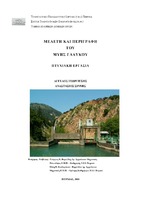| dc.contributor.advisor | Βαρελίδης, Γιώργος | |
| dc.contributor.advisor | Θεοδωρακάκου-Βαρελίδου, Πόπη | |
| dc.contributor.author | Γεωργίτσης, Άγγελος | |
| dc.contributor.author | Σίννης, Αναστάσιος | |
| dc.date.accessioned | 2013-09-05T09:21:29Z | |
| dc.date.available | 2013-09-05T09:21:29Z | |
| dc.date.issued | 2010 | |
| dc.identifier.uri | http://okeanis.lib2.uniwa.gr/xmlui/handle/123456789/148 | |
| dc.description.abstract | Το νερό είναι ένας παράγοντας ζωτικής σημασίας, ο οποίος υποστηρίζει όλες τις μορφές ζωής πάνω στον πλανήτη. Δυστυχώς η πηγή αυτή δεν είναι ισότιμα κατανεμημένη τόσο γεωγραφικά όσο και εποχιακά. Ορισμένα μέρη του πλανήτη αντιμετωπίζουν τον κίνδυνο της ξηρασίας, κάνοντας τα νερό να είναι πολύτιμο και ιδιαίτερα σπάνιο, ενώ σε άλλα σημεία οι πλημμύρες προκαλούν απώλειες ανθρώπινων ζωών και πολλαπλά προβλήματα. Ιστορικά, τα φράγματα, και γενικότερα οι υδροταμιευτήρες, χρησιμοποιήθηκαν για τη συλλογή, αποθήκευση και διαχείριση του νερού που είναι απαραίτητο για τη στήριξη του πολιτισμού.
Ανάλογα με την ύπαρξη ή όχι διαθέσιμων υδάτινων πόρων, επικρατούν διάφορες απόψεις γύρω από την υδροηλεκτρική ενέργεια. Στις περισσότερες ανεπτυγμένες χώρες, η υδροηλεκτρική ενέργεια δεν είναι ζήτημα υψηλής σημασίας στα μάτια του κοινού. Τα περισσότερα υδροηλεκτρικά εργοστάσια βρίσκονται μακριά από την προσοχή του πλατύ κοινού είτε υπέργεια είτε υπόγεια παράγοντας σημαντικές ποσότητες ηλεκτρικής ενέργειας. Άλλα πάλι βρίσκονται εκτεθειμένα σε κοινή θέα προσφέροντας λύσεις πολύ περισσότερες της ενέργειας, όπως η υδροδότηση περιοχών, ο έλεγχος του νερού, άρδευση, λύσεις για ψυχαγωγία (ψάρεμα κτλ.)
Όσον αφορά στην απόφαση δημιουργίας υδροηλεκτρικών σταθμών, οι κυβερνήσεις οφείλουν να λάβουν υπόψη τους μία ευρεία γκάμα ζητημάτων και να μην περιοριστούν μόνο στο οικονομικό μέρος. Πολλά από τα ζητήματα έρχονται σε σύγκρουση μεταξύ τους, γεγονός που φέρνει τη συζήτηση στην πολιτική αρένα. Στην παρούσα εργασία θα μελετηθούν τα ζητήματα που πρέπει να μελετηθούν από τους υπεύθυνους στην δημιουργία ενός υδροηλεκτρικού εργοστασίου, καθώς και οι περιβαλλοντικοί παράγοντες που ίσως παίξουν κάποιο ρόλο. Ταυτόχρονα θα μελετηθεί τεχνολογικά και από άποψη εγκαταστάσεων ο υδροηλεκτρικός σταθμός Γλαύκου στην Πάτρα. Μέσα από αυτό το παράδειγμα θα δούμε τη λειτουργία ενός υδροηλεκτρικού σταθμού και τα προβλήματα που αντιμετωπίζει ο συγκεκριμένος και πιθανώς πολλοί άλλοι. | el |
| dc.format.extent | 95 σελ. | el |
| dc.language.iso | el | el |
| dc.publisher | ΤΕΙ Πειραιά | el |
| dc.rights | Αναφορά Δημιουργού-Μη Εμπορική Χρήση-Όχι Παράγωγα Έργα 3.0 Ελλάδα | * |
| dc.rights.uri | http://creativecommons.org/licenses/by-nc-nd/3.0/gr/ | * |
| dc.subject | TPSH::Περιβάλλον::Ανανεώσιμες Πηγές Ενέργειας | el |
| dc.title | Μελέτη και περιγραφή του ΜΥΗΣ Γλαύκου | el |
| dc.type | Πτυχιακή εργασία | el |
| dc.contributor.department | Τμήμα Πολιτικών Δομικών Έργων | el |
| dc.contributor.faculty | Σχολή Τεχνολογικών Εφαρμογών | el |
| dc.subject.keyword | Υδροηλεκτρικά έργα | el |
| dc.subject.keyword | Υδροηλεκτρικός Σταθμός Γλαύκος | el |
| dc.subject.keyword | Βιωσιμότητα | el |
| dc.subject.keyword | Ανανεώσιμες πηγές ενέργειας | el |
| dc.subject.keyword | Ενέργεια | el |
| dc.description.abstracttranslated | Water is a vital resource that supports all forms of life on earth. Unfortunately, it is not evenly distributed by season or geographical region. Some parts of the world are prone to drought, making water a particularly scarce and precious commodity. In other parts of the world, floods that cause loss of life and property are major problems. Throughout history, dams and reservoirs have been used successfully in collecting, storing and managing water needed to sustain civilisation.
According to water resources availability, there are significant variations among countries regarding the importance of hydropower. In most developed countries, hydropower is not a high-profile issue in the eyes of the general public. A large part of the world’s hydropower plants are discreetly generating electricity and revenues while largely hidden from public view, either because the sites are remote, or because the facilities are often underground. Other hydro projects are in full public view, and contribute much more than renewable energy through the storage capacity of reservoirs by providing essential services such as water supply, flood control, irrigation, improved condition for navigation and water-based transport, fisheries, and recreational opportunities, which are taken for granted by large segments of the population.
In deciding on hydropower projects, governments have to consider a whole range of important policy objectives that are not internalised in market prices. Some or all of these competing, and occasionally conflicting, policy objectives inevitably bring major hydropower decisions into the political arena. In this study there will be discussed issues that should be considered by those who are responsible for the development of a hydropower project. At the same time it will be studied the hydropower plant of Glafkos, in Patras. Through this example we will examine the facilities of the specific plant and all the problems that faces and probably face many plants. | en |



